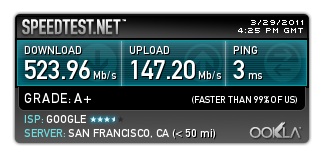Refreshing rant by Henry Blodget.
Wall Street has reacted to the first quarter in the Page regime by tossing the stock overboard. Larry Page is spending way too much, Wall Street says. Larry Page isn’t communicating well enough. Larry Page couldn’t even be bothered to spend more than a couple of minutes on the earnings call with Wall Street last night. So to hell with him!
Lost under the outrage, of course, is that Larry Page may be doing exactly the right thing: Focusing on Google and Google’s products and users, instead of Wall Street.
Wall Street loves to be made to feel that there is nothing that matters more to a CEO than Wall Street. But Wall Street’s focus is relentlessly short-term: Wall Street cares about this quarter and next quarter, not the next 10 years. And although short-term performance certainly provides an indication about where a company is headed, for the long-term value of the company itself, it’s nearly irrelevant.
If Google is to wrest back the mantle of innovation leadership from Apple and Facebook, it needs to focus on the long term. It needs to revitalize the culture of innovation that defined the company in the beginning. It needs to make big, bold bets that cost a lot of money. And it needs to address its biggest weaknesses. In short, it needs to do exactly what Larry Page and Sergey Brin said Google would do when it went public seven years go: Focus on the long-term, not the short term, and make decisions that won’t make short-term investors happy.
Yep. All of which confirms the wisdom of the decision the Google boys made before their IPO — to have two kinds of share, much as the Sulzbergers set up the stock structure of the NY Times. The founders control the shares which decide the issues; and, in the end, Wall Street can get stuffed.
.
, a device that the search giant hopes will change the way we think about computers – and in the process rain on the parades of Apple and Microsoft.

